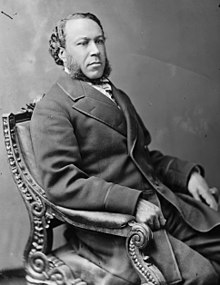Joseph Hayne Rainey was born into slavery on June 1832 in Georgetown, South Carolina. After the Emancipation Proclamation was issued in 1863, Joseph Rainey, like many other enslaved individuals, saw a glimmer of hope for a brighter future.
Joseph Rainey’s father, a barber, was able to save enough money to buy his family’s freedom. Education was denied to African Americans then, so Rainey never received a formal education. He became a skilled barber, allowing him to establish himself in his community and providing a platform for his growing political involvement.
Once the civil war broke out, Rainey and his wife Susan escaped to Bermuda. Joseph once more became a barber, and Susan opened a dress shop. After the Civil War, they moved back to South Carolina in 1866. During this time, Rainey helped form the state’s Republican party. In February 1870, Republican Senator Benjamin Franklin Whittemore resigned, and Rainey was nominated to fill the remainder of his 41st congressional term. In October that same year, Rainey won a full congressional representation for the 42nd Congress.
Rainey’s tenure in Congress was marked by courage, conviction, and an unyielding commitment to his principles. In the face of significant challenges, including intense racism and discrimination, Rainey stood tall as a representative of the people and a champion of civil rights. He became a vocal advocate for equal rights, pushing for legislation to dismantle the day’s discriminatory practices.
April 1, 1871, Rainey called for the passage of the Ku Klux Klan Act, which expanded the Federal Government’s law enforcement against vigilante white supremacist groups. On April 20th, President Ulysses S. Grant signed the act into law.
Rainey participation in the debate over the Civil Rights Act of 1875 sought to prohibit racial discrimination in public accommodations, transportation, and jury service. Rainey, along with other African American representatives, fervently argued for the passage of this critical legislation, recognizing its potential to bring about profound change and justice.
Though the Civil Rights Act of 1875 ultimately faced challenges and was later struck down by the Supreme Court, it remains a testament to the determination and vision of Joseph Rainey and his colleagues. Their tireless efforts laid the groundwork for future civil rights advancements.
Rainey’s presence on the floor of the House was a symbol of progress during a challenging era for our nation. He served alongside a small but dedicated group of African American congressmen known as the Reconstruction Era’s “Black Congressmen.” Together, they worked tirelessly to combat racial discrimination, promote education, and advocate for the rights of African Americans in the post-Civil War South.
More information can be found at History.house.gov
